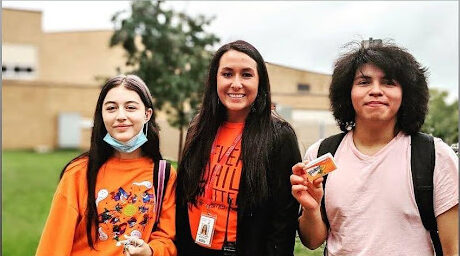By: Dawn Marie Johnson, Community Advocate, South Dakota
Orange Shirt Day is a day that hits home, reminding us of the painful history of the residential school system and the incredible strength of Indigenous communities. Held on September 30th each year, it’s a moment for us to reflect on the past, honor the resilience of Indigenous peoples, and consider how afterschool programs can play a meaningful role in recognizing the importance of this day. As a descendant of a boarding school survivor, I feel a strong connection to this day, and I choose to wear an orange shirt as a symbol of my commitment to reconciliation and healing.
Looking back
To truly grasp why Orange Shirt Day is significant, we need to take a peek into the dark pages of the residential school system throughout the US and Canada. These institutions, which ran from the late 19th century until the late 20th century, were part of a government effort to assimilate Indigenous children into Euro-Canadian culture. These kids were forcibly separated from their families, stripped of their languages, cultures, and traditions, and subjected to all sorts of abuse. The pain inflicted during this period continues to affect Indigenous communities today.
The orange shirt is a powerful symbol that stems from the experiences of Phyllis Webstad, a survivor of the St. Joseph Mission Residential School in British Columbia. On her very first day at the school, Phyllis wore a brand-new orange shirt, a gift from her grandmother. But that shirt was quickly taken away from her, symbolizing the loss of her identity, culture, and the trauma she endured. Wearing an orange shirt on September 30th is now a way to remember, reconcile, and stand in solidarity with survivors.
To learn more about Orange Shirt Day and for more resources, click HERE.
The Vital Role of Afterschool Programs
Afterschool programs offer a unique opportunity to contribute to the observance of Orange Shirt Day and the broader reconciliation journey. These programs can become a cornerstone for educating young people about the historical injustices Indigenous communities face, promoting empathy, and embracing cultural diversity and inclusion.
Learning Opportunities: Afterschool programs can incorporate lessons and activities that delve into the history of residential schools and the significance of Orange Shirt Day. This knowledge can help kids understand why reconciliation is essential and why it’s crucial to ensure such horrors are never repeated.
Cultural Exploration: Afterschool programs can celebrate Indigenous cultures, traditions, and languages. Inviting Indigenous elders and leaders to share their knowledge and stories can give kids a deeper understanding of the rich heritage of Indigenous communities.
Creativity and Expression: Creative activities like art and storytelling can allow children to express their feelings and thoughts about Orange Shirt Day. Art projects can serve as potent tools for healing and promoting reconciliation.
Community Engagement: By collaborating with local Indigenous communities, afterschool programs can organize events and activities that foster unity and dialogue. Engaging with Indigenous community members allows participants to connect with living history and witness firsthand the resilience of Indigenous cultures.
The Alaska Children’s Trust Orange Shirt Day toolkit can be found HERE.
Why I Wear Orange
Wearing orange on September 30th carries profound personal meaning for me. It symbolizes my solidarity with Indigenous communities and a commitment to raising awareness about the historical injustices my ancestors endured. It serves as a reminder that the trauma experienced by Indigenous peoples isn’t just a distant memory but an ongoing legacy that needs acknowledgment, healing, and reconciliation.
Orange Shirt Day is a day of reflection and remembrance, a day to honor the resilience of Indigenous communities and a day to commit to a brighter future. Afterschool programs can play a significant role in fostering understanding, empathy, and cultural appreciation among the next generation. By embracing the significance of Orange Shirt Day and integrating its lessons into its activities, these programs contribute to the ongoing journey of reconciliation and healing. Together, we can ensure that the will to survive passed down through generations leads us all toward a more inclusive and just society.
###
Led by the South Dakota Afterschool Network, in partnership with STEM Next Opportunity Fund, the Indigenous STEM in Afterschool Project is creating a robust foundation for transformative out-of-school time STEM programming in Indigenous communities.
By creating a community of practice for statewide networks, the Indigenous STEM in Afterschool Project will serve as a collaborative hub to disseminate powerful resources, facilitate knowledge exchange, and foster innovative ideas to drive policy changes and elevate the role of afterschool STEM to yield a more equitable future for Indigenous youth.



